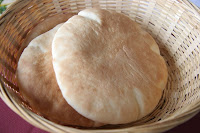An Offer You Can’t Refuse
By Brian Volck
August 6, 2009
 1 Kings 19:4-8; Psalm 34; Ephesians 4:25-5:2; John 6:41-51
1 Kings 19:4-8; Psalm 34; Ephesians 4:25-5:2; John 6:41-51Declining an offer of hospitality is, in traditional cultures at least, an insult. Elijah, on the lam from Ahab and Jezebel, prefers to die under the shade of his broom tree, but he knows not to insult God’s messenger. In John’s gospel, however, “the Jews” (a troubling Johannine formulation – what was Jesus if not Jewish? – in light of later Christian anti-Semitism) stop short when Jesus offers himself as the Bread of Life.
Jesus tells his questioners to stop complaining (the wording echoes the “murmuring tradition” of the people of Israel in Exodus through Numbers), stating the difference between the bread he offers and the manna “your ancestors ate in the wilderness, and they died.”
He says, “This is the bread that comes down from heaven, so that one may eat of it and not die. I am the living bread that came down from heaven. Whoever eats of this bread will live forever; and the bread that I will give for the life of the world is my flesh." This isn’t some friendly conversation, but one of those edgy gospel encounters preachers and commentaries usually smooth over, defanging the inherent, unsettling challenge. (At least here, the Greek still uses the verb phagein (to eat); a few verses later, it becomes trogein (to gnaw), raising the confrontation, in Jewish context, exponentially higher.)
Setting aside whatever Eucharistic implications your tradition reads in this passage, consider what Jesus is offering here: Himself. Rendering his person in the symbol of bread (metaphor is much too weak a word here) is at once homely and urgent. Bread is the commonest of foods in the West (the East might substitute rice, I suppose) as well as the “Staff of Life.” When eaten, bread not only gives us energy, it becomes our bodies. We are, after all, what we eat.
The God incarnate in Jesus, then, is a terribly messy God, mingling human and divine in unfathomable, unsettling ways, incorporating us into his body. Jesus’ insistence on the gift of life-giving flesh further dispenses with the notion that the Incarnation was a task taken up with reluctance, at arm’s length, with the Divine nose firmly held. As the Athanasian Creed has it, “…although he be God and Man, yet he is not two, but one Christ; One, not by conversion of the Godhead into flesh, but by taking of the manhood into God.” God, in the Incarnation, delights in magnanimity.
Who, then, are we to refuse him? Why do we, in word and action, continue to decline such overwhelming hospitality?
(Note: The Revised Common Lectionary offers 2 Samuel 18 as an alternate first reading. While this has some continuity with the Davidic story of the past few weeks’ Old Testament readings, it’s largely unconnected to the John 6 “bread of life discourse.” Furthermore, the Catholic lectionary features the reading from Kings. For those who, like me, find the Absalom story emotionally compelling, I apologize. To make up partially for this, I recommend listening to Pierce Pettis’ heartrending song, “Absalom, Absalom,” on his CD, “Making Light of It.”)